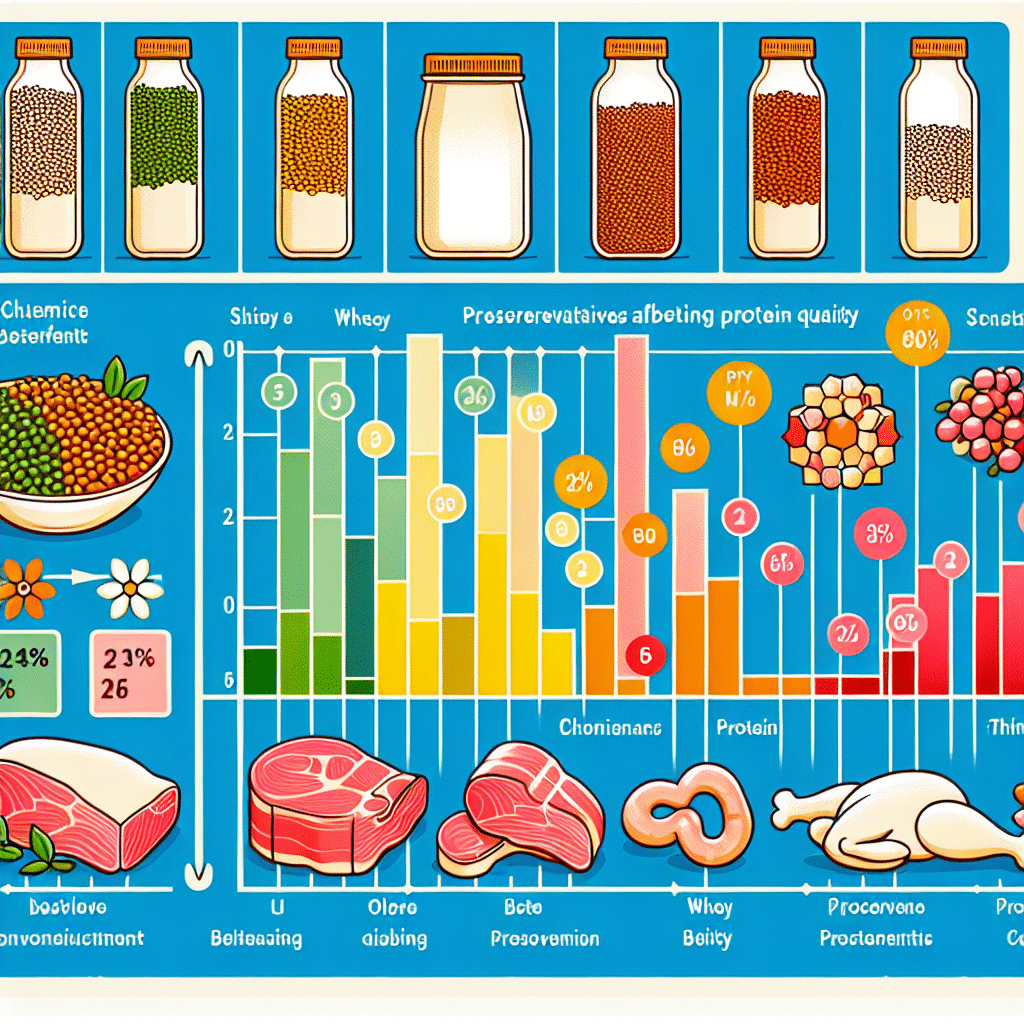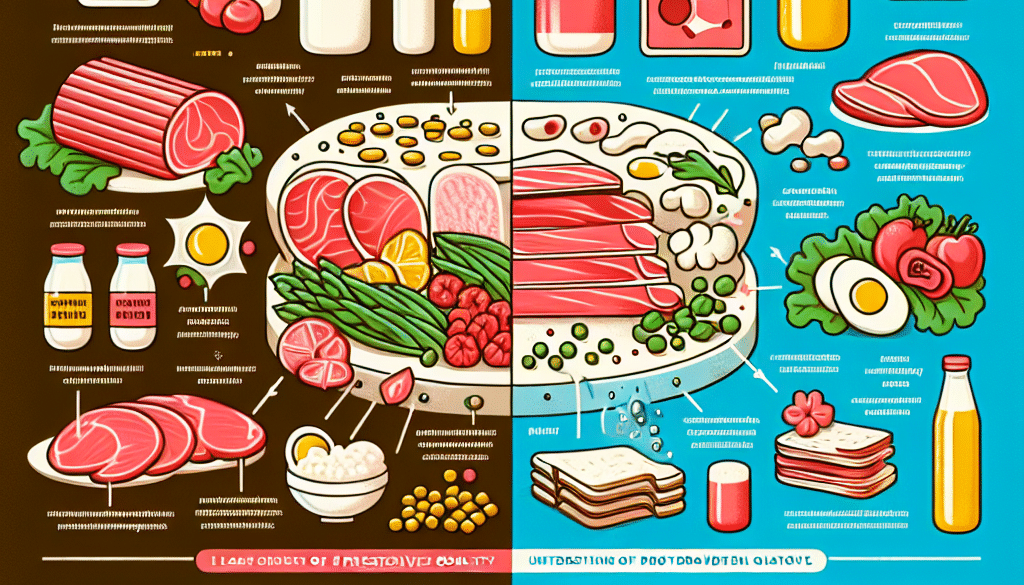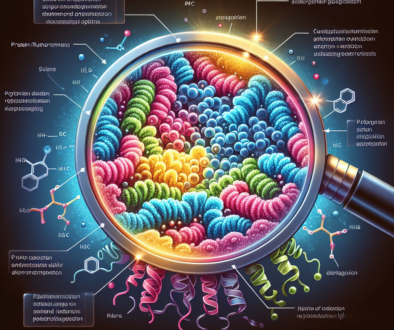Preservative Effects on Protein Quality: What You Need to Know
-
Table of Contents
- Preservative Effects on Protein Quality: Essential Insights
- Understanding Protein Preservation
- The Impact of Preservatives on Protein Structure
- Preservatives and Amino Acid Integrity
- Case Studies and Research Findings
- Preservatives and Protein Functionality in Food Products
- Choosing the Right Preservatives
- Regulatory Aspects and Consumer Preferences
- Conclusion: Balancing Safety and Quality
- Discover ETprotein’s High-Quality Protein Products
Preservative Effects on Protein Quality: Essential Insights

Proteins are fundamental to our diet, playing a crucial role in the structure, function, and regulation of the body’s tissues and organs. However, the preservation of protein-rich foods is a complex process that can affect their nutritional quality. Understanding the impact of preservatives on protein quality is essential for consumers, food manufacturers, and health professionals alike. This article delves into the science behind preservatives and their effects on protein integrity, offering valuable insights into what you need to know.
Understanding Protein Preservation
Protein preservation is a critical aspect of food processing that helps extend shelf life, maintain food safety, and reduce waste. Preservatives, both natural and synthetic, are substances added to food products to prevent spoilage caused by microorganisms such as bacteria, molds, and yeasts. While preservation is necessary, it’s important to consider how these additives can affect the nutritional and functional properties of proteins.
The Impact of Preservatives on Protein Structure
Proteins are made up of amino acids linked together in specific sequences, which fold into complex three-dimensional structures. The structure of a protein determines its function, and any alteration can compromise its biological activity. Preservatives can cause proteins to denature, which means they lose their natural structure and, consequently, their functionality. This denaturation process can be reversible or irreversible, depending on the type and concentration of the preservative used.
- Chemical Preservatives: Substances like sodium benzoate or nitrites can interact with protein chains, potentially leading to denaturation.
- Physical Methods: Techniques such as heat treatment or irradiation used in conjunction with preservatives can also affect protein structure.
Preservatives and Amino Acid Integrity
Amino acids, the building blocks of proteins, can be sensitive to preservatives. Some preservatives may react with amino acids, leading to the formation of new compounds that are not as nutritionally valuable or that could even be harmful. For example, nitrites can react with amino acids to form nitrosamines, some of which are known carcinogens.
Case Studies and Research Findings
Several studies have investigated the effects of preservatives on protein quality. For instance, research on the impact of sulfites, commonly used in dried fruits and wines, has shown that they can cause the breakdown of thiamine, an essential vitamin that works closely with proteins in metabolism.
Another study focusing on the effects of heat and preservatives on milk proteins found that pasteurization and the addition of preservatives could lead to the aggregation of proteins, affecting their digestibility and nutritional value.
Preservatives and Protein Functionality in Food Products
Proteins not only provide nutritional benefits but also contribute to the texture, taste, and appearance of food products. Preservatives can alter these functional properties, affecting the overall quality of the food. For example:
- Emulsification: Proteins help stabilize emulsions in products like salad dressings. Certain preservatives can disrupt this stability, leading to separation.
- Foaming: Proteins are responsible for the foam structure in products like meringues. Preservatives can reduce foaming capacity or stability.
- Gelation: Proteins can form gels in products like yogurt. Some preservatives might weaken the gel structure, resulting in a less desirable texture.
Choosing the Right Preservatives
When selecting preservatives, it’s crucial to balance food safety with the preservation of protein quality. Natural preservatives such as salt, sugar, vinegar, and certain spices have been used for centuries and can be less disruptive to protein structure. However, their effectiveness may be limited compared to synthetic preservatives, which are often more potent and can be used in smaller quantities.
Regulatory Aspects and Consumer Preferences
Regulatory agencies such as the FDA and EFSA set limits on the types and amounts of preservatives that can be used in food products to ensure safety. Additionally, there is a growing consumer demand for clean-label products with minimal processing and additives. This trend is pushing the food industry to explore innovative preservation methods that have minimal impact on protein quality, such as high-pressure processing (HPP) and modified atmosphere packaging (MAP).
Conclusion: Balancing Safety and Quality
In conclusion, while preservatives play a vital role in ensuring the safety and shelf life of protein-rich foods, their effects on protein quality cannot be overlooked. It is essential to choose the right type and concentration of preservatives to minimize negative impacts on protein structure and functionality. As research advances, new preservation techniques may offer better ways to maintain protein integrity while satisfying consumer demands for cleaner labels.
Discover ETprotein’s High-Quality Protein Products
If you’re looking for premium protein sources that prioritize quality and purity, consider ETprotein’s range of products. ETprotein is a reputable protein Chinese factory manufacturer and supplier, offering a variety of organic bulk vegan protein and plant proteins. Their products are characterized by a neutral taste, non-GMO, and allergen-free attributes, making them an excellent choice for various industries.
About ETprotein:
ETprotein, a reputable protein Chinese factory manufacturer and supplier, is renowned for producing, stocking, exporting, and delivering the highest quality organic bulk vegan protein and plant proteins. They include Organic rice protein, clear rice protein, pea protein, clear pea protein, pumpkin seed protein, sunflower seed protein, mung bean protein, peanut protein etc. Their offerings, characterized by a neutral taste, non-GMO, allergen-free attributes, cater to a diverse range of industries. They serve nutraceutical, pharmaceutical, cosmeceutical, veterinary, as well as food and beverage finished product distributors, traders, and manufacturers across Europe, USA, Canada, Australia, Thailand, Japan, Korea, Brazil, and Chile, among others.
ETprotein specialization includes exporting and delivering tailor-made protein powder and finished nutritional supplements. Their extensive product range covers sectors like Food and Beverage, Sports Nutrition, Weight Management, Dietary Supplements, Health and Wellness Products, and Infant Formula, ensuring comprehensive solutions to meet all your protein needs.
As a trusted company by leading global food and beverage brands and Fortune 500 companies, ETprotein reinforces China’s reputation in the global arena. For more information or to sample their products, please contact them and email sales(at)ETprotein.com today.












